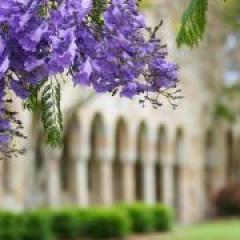Archaeological Investigations at the Portuguese Church, Thanlyin, Myanmar
Abstract
In 2017 the School of Social Science at The University of Queensland undertook an undergraduate archaeological fieldschool at the site of the Portuguese church in Thanlyin, Myanmar. The church is the oldest surviving colonial period building in Myanmar having been constructed in 1750 by the Portuguese missionary, Father Nerini, on land donated by Armenian colonialists. It was built on the site of an earlier Christian church that may date back to as early as 1599. The aim of the fieldschool was to determine the archaeological potential of the church site through geophysical prospection, excavation and mapping. This pilot season revealed intact archaeological remains in the form of buried walls of the 1750 church and subsurface features that may relate to the early church. Excavations of the extant church walls also revealed evidence of 18th century construction techniques and the stratigraphic profiles allowed for taphonomic interpretations. Students also had the opportunity to engage and collaborate with members of the local community as well as government officials from the Ministry of Religious Affairs and Culture without whose support and consent this project would not have been possible.
About the presenters
Associate Professor Jon Prangnell
Associate Professor Jonathan Prangnell is a historical archaeologist in the School of Social Science. His research interests include the development of capitalism and its relationship to colonialism, Victorianism and industrial innovation. He has also published widely on the taphonomic and social transformations that result in archaeological record of historic period burials. Jonathan is the immediate past-president of the Australasian Society for Historical Archaeology, is on the editorial board of the International Journal of Historical Archaeology, and on the Brisbane City Council Heritage Advisory Committee.
Dr Kelsey Lowe
Dr Kelsey M. Lowe has over 16 years experience in archaeology and specialises in archaeological geophysics, geoarchaeology and GIS. Her formal qualifications include a Master of Arts in Anthropology from University of Mississippi and a doctorate in Archaeology from the University of Queensland (UQ). Dr Lowe has worked in the United States, South America, Australia, Cyprus, Greece, Turkey and Myanmar, and recently finished a postdoctoral position with the Institute of Mediterranean Studies, Foundation of Research and Technology, Hellas (IMS-FORTH) in Crete. Currently, she is an ARC Senior Research Associate at the University of Southern Queensland and an Honorary Research Fellow at UQ.
Dr Andrew Sneddon
Andrew Sneddon has been Director of the UQ Culture & Heritage Unit since 2009. He is an archaeologist with specialities in Mediterranean prehistory and historical archaeology, especially the archaeology of the poor. He is currently the Director of the UQ-Alampra Archaeological Mission (Cyprus) and Co-Director of the Yangon Urban Archaeology Project.
About Archaeology Working Papers
The Working Papers in Archaeology seminar series provides a forum for dissemination of archaeological research and ideas amongst UQ archaeology students and staff. All students are invited to attend the series and postgraduate students, from honours upwards, are invited to present their research. The aim is to provide opportunities for students, staff and those from outside UQ, to present and discuss their work in an informal environment. It is hoped that anyone interested in current archaeological directions, both within and outside the School and University, will be able to attend and contribute to the series.
2025 Upcoming Sessions
| Date | Presenter |
|---|---|
| 8th August | Nicholas Hadnutt and Lincoln Morse |
| 15th August | Jane McMahon |
| 22nd August | Martin Gibbs |
| 29th August | Karen Cooke |
| 5th September | Shoshanna Grounds |
| 12th September | Meg Walker |
| 19th September | Marc Cheeseman |
| 26th September | Ladislav Nejman |



